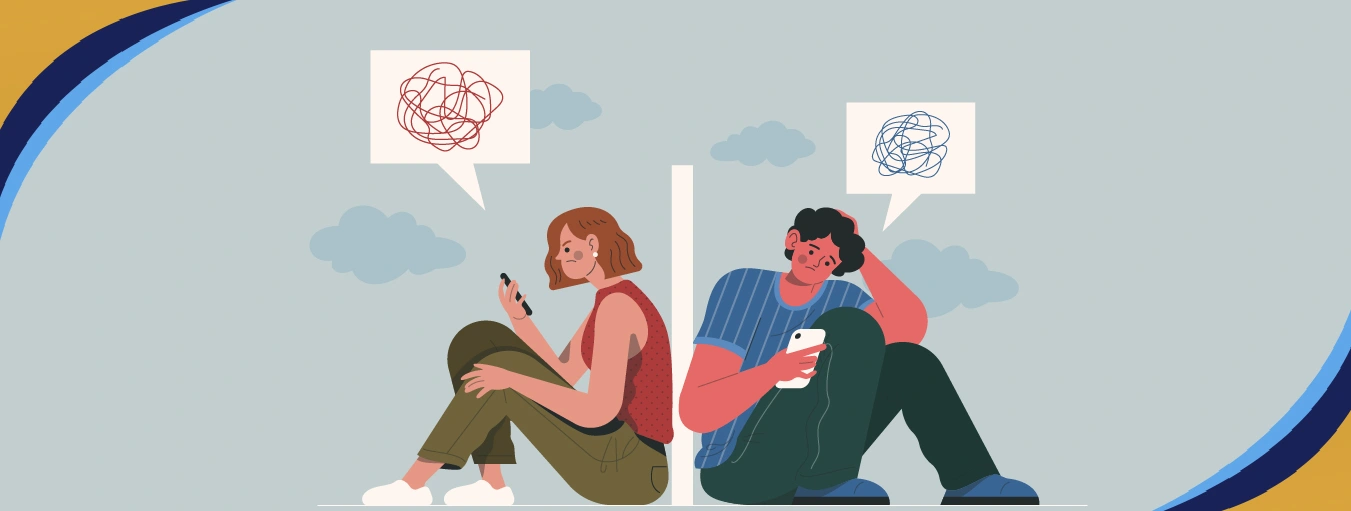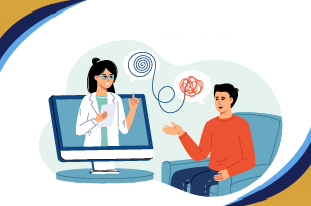Life is continuously stressful since stress is a natural occurrence in daily living. From studying for that big test to meeting a demanding work deadline to a clash within the family or even a fight with a close friend, we have all gone through stress at some point. However, when stress takes the form of repeated or intense experiences, it alters the person’s mental and physical state. One such type of stress is episodic acute stress, which most people experience but do not necessarily comprehend. It is characterized by recurring acute stress, which different events or behaviors may cause.
This blog will discuss what is episodic acute stress, acute stress examples, episodic acute stress symptoms, what causes it, and how you can minimize its effects on your life.
What Is Episodic Acute Stress
Acute stress is an involuntary response when a person evaluates a challenge or threat. It’s a short-term response often referred to as a fight or flight response because it prepares the body to either confront a threat or flee from it. Acute stress can be described as a stressful condition that resolves when a situation changes; examples of acute stress can be described as stressful circumstances at intervals.

Those who have experienced acute stress disorder may effectively be living their lives in a permanent state of heightened arousal and looming. They always move from one state of emergency to another and give service in one crisis only for the other to follow. If this stress continues, it can be bad for your mental and physical health.
Read More: Can Anxiety Disorder Cause High Blood Pressure? Insights About The Connection
Common Causes Of Episodic Acute Stress
Various factors can trigger episodic stress, such as:
- Personality profiles and actions:
It is also worth mentioning that acute stress episodic depends on the subject’s personality more often than not. For instance, people with Type A personalities are most often described as being prone to aggressive behavior, time-sensitive, competitive, and ambitious. These people may usually expose themselves to stressful situations due to unrealistic targets, compulsion, and demanding standards they set. They often have busy lives and the need to be in charge, and therefore, they tend to have chronic stress episodes.
Also, those who are choosy or perceive things negatively and those who always expect something terrible to happen are susceptible to episodic acute stress. The constant expectation of a threat causes them to experience anxiety in cycles, making it acute stress episodes.
- Work and Life Situations
Living daily life is also a significant reason for episodic acute stress. Individuals in careers that demand emergency or critical care, such as healthcare practitioners, law enforcement agencies, or the corporate world, spend most of their time under pressure. They may work under much pressure, experiencing one sort of stress crisis or another frequently, like short deadlines, hardship decisions, or emotional trials that might cause repeated episodes of acute stress.
Also, other changes in life situations or unresolved personal problems can cause episodic acute stress. These include:
- Financial struggles: Problems such as debt, bills, job insecurity, etc., can cause multiple breakdowns in stress.
- Family conflicts: Often, conflicts with a partner, children, or other relatives contribute to the formation of chronic stress.
- Health issues: Having chronic disease, either personally or through a dependent, might mean constantly experiencing high-stress conditions.
- Social pressures: Events that relate to the want to uphold social status, relationships, or any public image they have also cause episodes of acute stress.
Symptoms Of Episodic Acute Stress
Episodic acute stress is characterized by different symptoms that affect the human psychological and bodily condition. This kind of stress is typical. Therefore, the symptoms develop gradually and are easily noticed. These symptoms often fall into three categories: affective, intellectual, and psychomotor.
- Emotional Symptoms
- Irritability and Anger: People with episodic acute stress always appear anxious. This also means they may be impulsive, lose their temper over trivial matters, or get angry at insignificant problems.
- Anxiety and Panic: Thus, acute stress can be chronic, and constant episodes of AS make a person experience Generalized Anxiety Disorder or panic: a feeling of fear or panic.
- Mood Swings: The high-stress levels will, at worst, lead to swings from being high-spirited and working harder to being moanful and defeated.
- Cognitive Symptoms
- Difficulty Concentrating: Those experiencing episodic acute stress also tend to have a short span of attentiveness because their minds are perpetually racing or are otherwise cluttered with concerns.
- Negative Thinking: Moderate and chronic stress can cause individuals to appraise events negatively, meaning they view events and situations in the worst possible manner.
- Physical Symptoms
- Headaches: Stress causes tension headaches and sometimes migraines if the stress is too high.
- High Blood Pressure: These repeated stress responses can increase blood pressure within the body, and increased tension places stress upon the heart, increasing the risk for heart disease.
- Fatigue: One effect of chronic stress is fatigue and weakness, in which the affected individuals will always feel tired and weary.
- Digestive Issues: Hormones resulting from stress can cause gastrointestinal disturbances, including ulcers, stomach pains, nausea, diarrhea, vomiting, or constipation.
Long-Term Impact Of Episodic Acute Stress
Such acute stress that is not being addressed can adversely impact the framework of human health in the long run. Over time, stress hormones, such as cortisol and adrenaline, bring about a decline in immune function, exposing individuals to diseases. This can end up causing other related diseases, including heart disease, diabetes, anxiety, and depression, among others. This can affect relationships, work productivity, and overall quality of life.
Managing and Reducing Episodic Acute Stress
Fortunately, episodic acute stress is well-tolerated. It is possible to minimize the number of stress episodes and even prevent one from happening by practicing the right things. Here are some effective methods to manage episodic acute stress:
- Identify Triggers
The first solution in handling episodic acute stress is to determine what causes it to be acute and episodic. This is especially true when creating a simple stress diary that records the middle and large stressful events one experiences or following a medication management routine. Once people know what causes stress, they can either confront or handle it better to control or remove the number one source.
- Time Management
Lack of time awareness usually results in episodic acute stress, particularly in the Type A personality. Achieving all these can lessen the tendency to be always on high alert and extend overwhelming pressure on the workers. Another way the workload may be optimized is by splitting tasks into smaller parts to counter feelings of the overwhelming task.
- Relaxation Techniques
Thus, regularly practicing various forms of relaxation is considered necessary to control sporadic acute stress. Healthy ways of relaxing the body include breathing exercises like deep breathing, muscle relaxation like progressive muscle relaxation, or meditation. Yoga, too, could enhance several people’s coping skills and also help provide some emotional regulation or stability.
- Regular Exercise
Exercise is one of the most valuable activities for beating stress. Endorphins are the body’s feel-good hormones, and as cortisol levels, the stress hormone is lowered through exercise, and so are the effects of stress. Whether it is the morning walk, workout in the Gym, or yoga exercise in the evening, daily exercise helps avoid stress buildup and decrease the severity of acute stress events.
- Healthy Lifestyle Choices
Reducing stress is a benefit of a healthy lifestyle. This includes eating a balanced diet, adequate water intake, and sleeping well. Sleep is considered significant since the lack of sleep only amplifies stress and makes people feel at the receiving end in stressful situations.
- Seek Professional Help
People experiencing recurrent acute stress situations should consult a therapist or a counselor. CBT helps clients recognize and alter negative beliefs that are causal agents of stress. Additionally, it can help prevent other mental health disorders as well, such as adjustment disorders, dissociative disorders, psychosis, mood disorders, and eating disorders. A therapist can also assist her patients in replacing unhealthy ways of dealing with situations with healthy ones.
- Set Boundaries
Individuals who undergo episodic acute stress might be workaholics, over-committed, or pressured to agree to most things. Knowing how to say no, whether in a friendship or workplace, can help lessen unnecessary stress. Negatively, denying a once-in-a-while ‘no’ and guarding one’s time for leisure is instrumental in avoiding burnout.
Read More: What Causes An Eating Disorder?
Conclusion: Take Control of Episodic Acute Stress
Episodic acute stress is much more than the usual occasional worrying response; it is repeated exposure to stress that can be detrimental to the individual’s mental and physical well-being. Causes, on the other hand, can be explained; thus, identifying the symptoms of stress and learning how to practice good stress management can take one’s life back and eliminate the dominance of stress.
Stress is a part of life, but it doesn’t mean it must take over your life entirely. As has been revealed, people who are chronically stressed can turn their lives around and live a third kind of lifestyle free of acute stress episodes by using appropriate strategies and relaxation techniques and seeking appropriate help and support. Orange Coast Psychiatry telehealth services are your best choice!
























